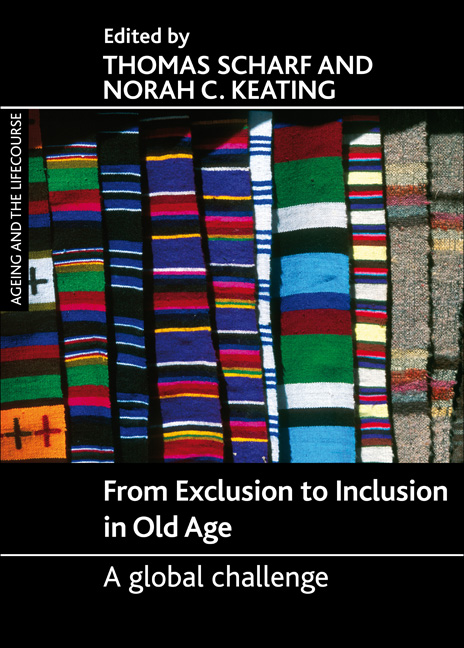Book contents
- Frontmatter
- Dedication
- Contents
- List of tables and figures
- Acknowledgements
- Notes on contributors
- Foreword
- one Social exclusion in later life: a global challenge
- two Globalisation, economic recession and social exclusion: policy challenges and responses
- three International migration: patterns and implications for exclusion in old age
- four Social inclusion of older people in developing countries: relations and resources
- five Exclusion from material resources: poverty and deprivation among older people in Europe
- six Social inclusion of elders in families
- seven The impact of changing value systems on social inclusion: an Asia-Pacific perspective
- eight Age discrimination as a source of exclusion in Europe: the need for a human rights plan for older persons
- nine Towards inclusive built environments for older adults
- ten Revisiting social exclusion of older adults
- Index
three - International migration: patterns and implications for exclusion in old age
Published online by Cambridge University Press: 07 September 2022
- Frontmatter
- Dedication
- Contents
- List of tables and figures
- Acknowledgements
- Notes on contributors
- Foreword
- one Social exclusion in later life: a global challenge
- two Globalisation, economic recession and social exclusion: policy challenges and responses
- three International migration: patterns and implications for exclusion in old age
- four Social inclusion of older people in developing countries: relations and resources
- five Exclusion from material resources: poverty and deprivation among older people in Europe
- six Social inclusion of elders in families
- seven The impact of changing value systems on social inclusion: an Asia-Pacific perspective
- eight Age discrimination as a source of exclusion in Europe: the need for a human rights plan for older persons
- nine Towards inclusive built environments for older adults
- ten Revisiting social exclusion of older adults
- Index
Summary
Introduction
The globalisation of international migration flows is changing the demographics of ageing populations across the world and the ethnic composition of most societies (Castles and Miller, 1998). Even if some regions of the world are more affected than others, few societies are entirely exempted from this phenomenon. With specific respect to Europe, Muus (2001) has argued that the globalisation of international migration has transformed the European Union into a de facto region of immigration. This is why Warnes et al (2004) have proposed that this phenomenon is as important to the study of ageing and old age as population ageing itself. As is also suggested in Chapter Two, globalisation is transforming the very boundaries we regard as relevant to the experience of ageing (Phillipson, 2009).
The feminisation and differentiation that characterise current migration flows are two features of particular interest to migration researchers (Castles and Miller, 1998). It was once the case that most migrants were men and that most of those who migrated across national borders had relatively disadvantaged backgrounds (at least if compared to people in the receiving countries; migration research has since shown that, compared to those left behind in the sending countries, migrants are often relatively privileged). Nowadays, neither the gender nor the background of migrants can be taken for granted. For example, women now play a central role in almost all forms of migration flows. With respect to the differentiation of migration flows to Europe, King (2002) has argued that the globalisation of international migration challenges us to consider migration in new ways since the pervasive assumption that all migrants are poor and uneducated no longer holds true – and probably never did hold true. It is for these reasons that migration researchers have urged other social scientists to acknowledge that the globalisation of international migration should not be reduced to the upswing in migration flows with which it is typically associated (Castles, 2000; Faist, 2000). The challenges that this phenomenon poses are actually far greater. What is actually at stake is our very understanding of what culture is (Tomlinson, 1999), who migrants and refugees are (Castles, 2000; Richmond, 2002), and how inequality and the so-called ‘periphery’ are to be addressed (Beck, 2000).
- Type
- Chapter
- Information
- From Exclusion to Inclusion in Old AgeA Global Challenge, pp. 33 - 50Publisher: Bristol University PressPrint publication year: 2012



